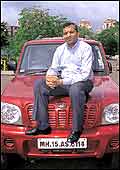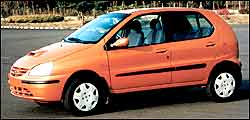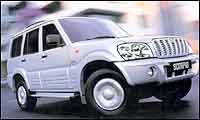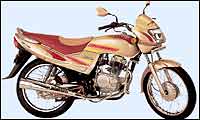 |
 |
| Revving up: Tata Motors'
Ratan Tata (left) and M&M's Pawan Goenka are eyeing big
export gains |
Hear
that noise? Good guess, but no, it isn't the noise of the CityRover's
1.4 litre mechanical heart as the car does 0-60 in 11.5 seconds.
What you hear is the determined march of a clutch of Indian auto
companies as it ventures into the wide world beyond where sharks
like Toyota, gm, Ford, Harley, Honda, and Daimler-Chrysler (some
ailing, but sharks, all) rule.
There's Tata Motors, which is close to acquiring
South Korea's Daewoo Commercial Vehicle for around Rs 530 crore,
a move that, apart from helping the company make inroads into the
Korean market, will provide it with a convenient beachhead into
the Chinese one. This, from a company that has already started exporting
its small car, Indica, to the UK (badged CityRover) and will, over
the next five years, sell close to 100,000 of these through its
deal with Rover in the UK and Europe.
There's Mahindra & Mahindra (M&M),
which has identified seven overseas markets for its UTE Scorpio.
Two-wheeler makers such as Kinetic, TVS Motor, LML, and Bajaj are
in various stages of going global. Even Hindustan Motors is in the
process of setting up an assembly unit in Sri Lanka to manufacture
its flagship product, the 50-year-old Ambassador.
This wasn't in anyone's script. In the face
of global competition-there's no shortage of it in the local market-India's
indigenous auto industry was expected to surrender. The signs were
all there: falling marketshares, bleeding financial statements,
even dispirited chief executives griping about how their companies
hadn't been given a chance to get used to the rules of the open
market. Then, surprisingly, the industry pulled itself up by the
bootstraps: It focussed on restructuring operations, reducing costs,
and optimising its supply chain. "The plans of all these companies
are very real," explains Munesh Khanna, Managing Director,
NM Rothschild & Sons (India) Private Limited. "We (Indian
industry) are so cost conscious, and today, most input costs have
been taken care of, even the quality has improved. So, it's logical
to expand." That's just what the Indian auto industry is doing.
WHAT?
The products that are going global |
 Indica Indica
The Indica is already being sold under the Rover marque in the
UK. Now, the Tata Group wants to take it to other developed
countries, including the US
 Scorpio Scorpio
M&M wants to sell a quarter of the Scorpios it
makes overseas by 2005. It plans to target Ecuador, South
Africa, Middle East, China, Indonesia, Turkey and the CIS
countries by establishing assembling, even manufacturing facilities
in them
 Pulsar Pulsar
Bajaj wants to vend the first motorcycle it developed
without help from partner Kawasaki in Indonesia, the Philippines,
and Brazil
 Freedom Freedom
Two-wheeler maker LML is investing in joint ventures
in Colombia and Egypt that will make the Freedom, its first
home-grown motorcycle
Tata Motors' New Truck Platform
It's all very hush-hush now, but this truck, now under
development, will be sold with value-adds in developed markets
such as the US and Europe, and as a stripped-down version
in under-developed ones
Tata Motors' Rs 100,000 car
Chairman Ratan Tata's dream already has takers, such
as Senegal. Other African and Asian countries could lap it
up too
|
WHERE?
The countries Indian automakers are looking
at |
Countries in a similar
stage of economic or market development as India
South Africa, Ecuador, Egypt, Middle East, Malaysia, Sri Lanka,
Peru, Argentina, Singapore, Latin America, Mexico, Iran
Developed countries that cannot match
Indian costs
The US, the UK, Italy, Sweden, Germany, Spain, Australia,
New Zealand
Under-exploited markets
Colombia, Nepal, Zambia, Zanzibar, Zimbabwe, Bangladesh, Afghanistan
|
Quid Pro Quo?
"If we are allowing products to come in
from other countries," says Ravi Kant, Executive Director (Commercial
Vehicles), Tata Motors, "then it is in the fitness of things
that we go global as well." It isn't just a simple quid pro
quo, but yes, that's more or less what Indian companies are doing.
"In both commercial vehicles and passenger cars, Tata Motors
will seek to acquire meaningful international presence, either directly
or through regional alliances and partnerships," Ratan Tata,
Chairman, Tata Motors, had told Business Today earlier.
At the heart of such strategic intent is the
belief among Indian auto companies that the very factor that has
helped them succeed in India-a combination of high quality and low
price-can help them succeed in other markets as well. "The
Indian auto industry has gone through one of the most intense business
restructuring and cost cutting exercises seen in corporate India,"
says Jyotivardhan Jaipuria, the head of research at DSP Merrill
Lynch.
Then, there's the small matter about the world
being ready for made-in-India products. Pawan Goenka, Chief Operating
Officer (Automotive Segment), M&M, is just back from the Harvard
Business School where he was enrolled in an advanced management
programme. While at the school, he polled his class of 50 on its
perception of Indian products. The result pleased him. "Five
or six years ago, Indian products were simply not acceptable; gradually,
the perception is changing." "Indian products are increasingly
becoming acceptable (to global customers)," echoes Rajat Dhawan,
Senior Engagement Manager, McKinsey. However, Amul Gogna, Executive
Director of rating agency ICRA, believes that while Indian products
are gaining ground overseas, it will take some time before they
are universally acceptable. Why does Maruti export under the Suzuki
badge and Tata Motors under the Rover one, he asks.
Still, armed with their success in the domestic
market-M&M's Scorpio, Bajaj's Pulsar, Tata's Indica, TVS' Victor,
and LML's Freedom all fit the bill-and newfound aggression, Indian
companies are venturing forth. TVS Motor Company has been evaluating
the ASEAN (Association of South East Asian Nations) market in terms
of exports, joint ventures, even acquisitions. Pune-based Kinetic
Engineering is eyeing markets such as Indonesia, Vietnam, and Brazil.
Bajaj Auto, for its part, has a global strategy that includes going
overseas through distributors, establishing manufacturing bases,
and developing a product for foreign markets and launching it through
a joint venture (JV) partner. "On top of our priority-list
are Indonesia and the Philippines, where we want to set up manufacturing
facilities. After that, we will look at Brazil," says R.L.
Ravichandran, Bajaj Auto's VP (Business Development and Marketing),
who is spearheading its globalisation-drive.
Not every company has a global strategy that
is as ambitious as Tata Motors', Bajaj's, or M&M's. "We
are looking at small markets where there is no logic in setting
up full-fledged assembly plants," says Rakesh Jayal, Senior
Vice President, LML. In Colombia and Egypt, for instance, LML will
soon set up JVs with local firms that will take care of the assembling
and marketing. Kinetic Engineering, when it makes its move (in the
next six months or so, according to the company) will follow a similar
route. "You require a certain critical mass to set up a plant,"
says Manmohan Khera, Kinetic's Joint Managing Director. "We
could opt for a JV or a technical collaboration."
Rothschild's Khanna believes Indian companies
should be more aggressive and actively scout for acquisitions. He
points to Europe where several small- and mid-sized auto- and auto-component
companies are reeling under recessionary conditions. More than an
acquisition, however, the industry, says Goenka, desperately needs
one Indian product, any Indian product, maybe a computer, to become
a global success. Its success, he reasons, will rub off on Indian
automobiles too. Now, wouldn't it be ironic if this product happens
to be a car, UTE, truck, or motorcycle. Stranger things have been
known to happen.
|
